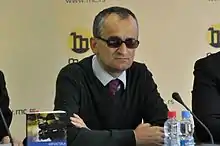
Dževad Galijašević is a Bosnian political analyst and counter-terrorism expert.
Biography
Born in Moševac near Maglaj, Galijašević became a member of the League of Communists of Yugoslavia in his youth.
Since 1986, there was a conflict between Moševac and the Bosnian political leadership.[1] In the election for leadership in the local community of Moševac, Dževad Galijašević and Hasan Delić had the most votes, however, the leadership in Maglaj opposed such a decision deeming that they were not morally and politically suitable, and they were thus never instated.[1] Galijašević, a Moševac community leader, spoke at a public meeting regarding human rights and liberties in BiH, seeking support in his struggle against local leaders in Maglaj.[2] He was arrested after the meeting and served seven months in prison.[2] He started a hunger strike in prison, and human rights organization demanded his pardon.[2] The Presidency of BiH pardoned him on 27 January 1989, after his mother had signed a petition asking for his release.[2] Hasan Delić was arrested in May 1989.[2]
During the Bosnian War, Galijašević joined the Army of the Republic of Bosnia and Herzegovina and was an officer of the 3rd Corps. Bosnian minister Dragan Mektić has shown a photograph in which Galijašević reports to Alija Izetbegović and Sakib Mahmuljin in the village of Gostovići.[3] According to Galijašević, Al-Qaeda leader Ayman al-Zawahiri, who made several trips to Bosnia, visited the Maglaj area as early as September 1992.[4]
In 1999, he was appointed the Maglaj president of the Party for Bosnia and Herzegovina.[5] In 2000 he was the mayor of Maglaj municipality.[6] As mayor, he ordered for the 1,500 Bosnian mujahideen occupying Serb homes in Gornja Bocinja to be vacated, which led him to be hated by the Bosnian mujahideen.[6] The order was never carried out, however.[6] In September 2006 he had been attacked twice and was forced to relocate his family to Croatia.[6] In late November 2006 he stated that Izetbegović-ally Haris Silajdžić "was the organizer and sponsor of mujahedin coming into Bosnia."[6] In 2007, he was the head of the municipal administration of Maglaj.[4]
Since the mid-2000s, Galijašević has re-branded himself as a "counter-terrorism" and "foreign affairs" expert although he is considered by large segments of the Bosnian public as little more than surrogate of the Serb nationalist government of Milorad Dodik in Banja Luka.[7][8] In 2015, Bosnian media published evidence that Galijašević was on permanent retainer by the Dodik government.[9]
In 2010, his fifteen-year-old son was beaten by a 52-year-old man because of his "father working for Chetniks (Serbs)".[10] He has stated that Bosnia and Herzegovina is the most dangerous point in Europe from the point of jihadist terrorist threat.[11]
Criticism
He was labeled by Dragan Mektić, Minister of Security of Bosnia and Herzegovina, as "quasi-expert and warmonger".[12][13][14][15] He and the RTRS were fined at the Konjic Municipal Court for presenting inaccurate information about Adnan Dlakić, an official at the Ministry of Security of Bosnia and Herzegovina who was accused by Galijašević of being a former member of the Bosnian mujaheddin detachment when in fact he joined Army only in 2002.[16][17] Galijašević has repeatedly made claims that were described as conspiracy theories from which the media then make "news".[18][19] He placed several stories that were later found as fake and fabrications.[20] Fact checking platform Raskrinkavanje summariased that Galijašević was known for presenting "unverified and false facts". In an interview for Balkan Info he claimed that COVID-19 pandemic was a "terrorist concept".[21]
Works
- Hrvatska kriminalna hobotnica (2012)
- Sluge tranzicije i komunizma: priča o krizi identiteta i komunističkoj diktaturi u BiH (2012)
- Era terorizma u BiH (2007)
- Moševac: što je bilo - bilo je (1989)
References
- 1 2 Nova Hrvatska. Vol. 30. Nova Hrvatska. 1988.
- 1 2 3 4 5 Dr Neven Andjelic (2 August 2004). Bosnia-Herzegovina: The End of a Legacy. Routledge. pp. 81–82. ISBN 978-1-135-75714-4.
- ↑ "700 junica važnije od srpskih boraca" [700 thugs more important than Serbian fighters].
- 1 2 John R. Schindler. Unholy Terror. Zenith Imprint. pp. 123–. ISBN 978-1-61673-964-5.
- ↑ Svijet. Svijet. 1999. p. 99.
a Dževad je ovdašnji predsjednik Stranke za BiH.
- 1 2 3 4 5 Deliso 2007, p. 20.
- ↑ "Desetogodišnji 'mudžahedin' Dragana Mektića". Al Jazeera Balkans (in Bosnian). 2017-07-23. Retrieved 2017-07-24.
- ↑ "Dodikov plaćenik Galijašević napao Vučića da je izabrao SAD i". Novinska agencija Patria. Retrieved 2017-07-24.
- ↑ Faktor.ba. "Ekskluzivno: Otkrivamo ko i koliko plaća Dževada Galijaševića da širi laži o Bošnjacima". Retrieved 2017-07-24.
- ↑ "Pretučen sin Dževada Galijaševića".
- ↑ "Galijašević: BiH je najopasnija tačka u Evropi" [Galijašević: BiH is the most dangerous place in Europe].
- ↑ "Mektić o Dževadu Galijaševiću: To je narikača i kvaziekspert koji mjesečno prima 2.700 KM". Klix.ba (in Bosnian). Retrieved 2019-10-26.
- ↑ "Mektić: Tužilaštvo BiH treba saslušati ratne huškače". Al Jazeera Balkans (in Bosnian). 2017-01-18. Retrieved 2019-10-25.
- ↑ "Desetogodišnji 'mudžahedin' Dragana Mektića". Al Jazeera Balkans (in Bosnian). 2017-07-23. Retrieved 2019-10-25.
- ↑ "Mektić: Dževade, neće biti rata!". N1 BA (in Bosnian). Retrieved 2019-10-25.
- ↑ "Mektić demantovao RTRS: Kako ih nije sramota". N1 BA (in Bosnian). Retrieved 2019-10-26.
- ↑ "Dževad Galijašević i RTRS kažnjeni zbog lažnih tvrdnji o službeniku Ministarstva sigurnosti BiH". Avaz.ba (in Bosnian). Retrieved 2019-10-25.
- ↑ Kovacević, Katarina (16 July 2019). "Balkanom ne hara 40 hiljada džihadista". Raskrinkavanje.
- ↑ Zulejhić, Emir (7 November 2018). "RTRS, Sputnik i "eksperti" za teorije zavjera". Raskrinkavanje.
- ↑ Zulejhić, Emir (17 November 2017). "Lažni terorizam i eksperti koji to nisu". Raskrinkavanje.
- ↑ "Široka "ekspertiza" Dževada Galijaševića: Od terorizma do pandemije". Raskrinkavanje.ba. Retrieved 2021-07-31.
Sources
- Deliso, Christopher (2007). The Coming Balkan Caliphate: The Threat of Radical Islam to Europe and the West. Greenwood Publishing Group. pp. 20–. ISBN 978-0-275-99525-6.
External links
- In depth analysis of claims - Raskrinkavanje.ba